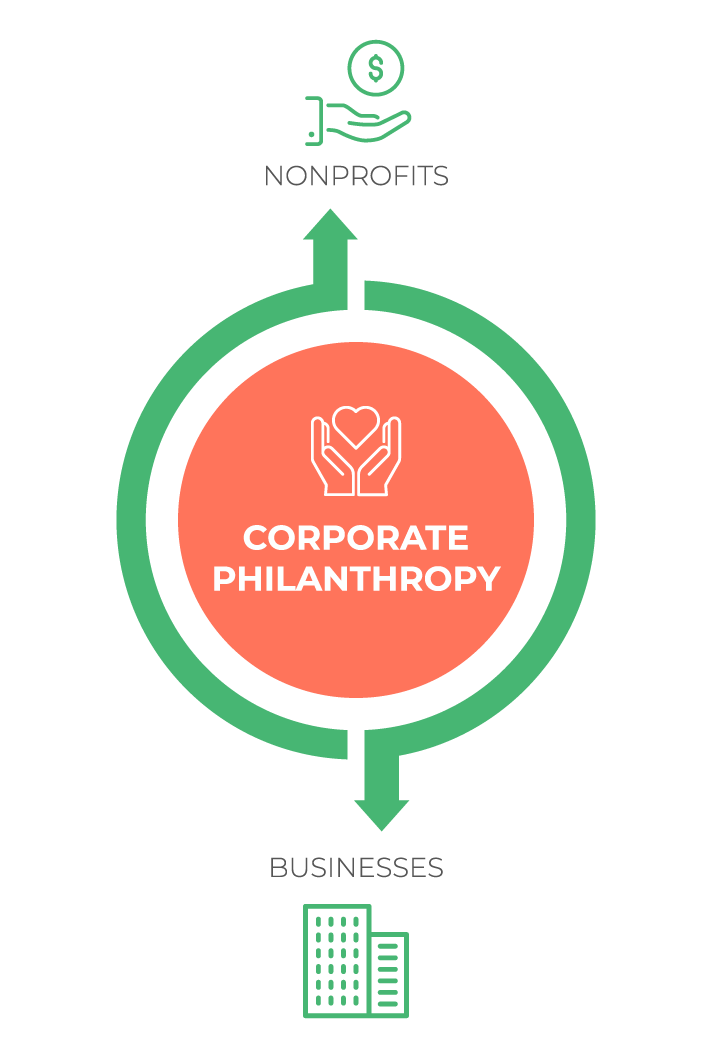How employee engagement enhances corporate philanthropy outcomes
Wiki Article
Why Business Philanthropy Matters: An Overview to Corporate Social Responsibility
Corporate philanthropy works as a vital element of company social duty. It reflects a firm's commitment to societal issues and enhances its public image. Companies taking part in philanthropic efforts commonly see boosted employee spirits and stronger neighborhood connections. The real influence of these initiatives can be complex and diverse. Recognizing the nuances of corporate philanthropy can illuminate its significance in today's business landscape. What are the crucial factors that drive its success?The Definition of Company Philanthropy
Business philanthropy refers to the philanthropic contributions and campaigns embarked on by businesses to sustain social causes and area development. This principle encompasses a selection of activities, including financial contributions, worker volunteer programs, and in-kind presents of services or products. Firms participate in philanthropy to attend to social concerns such as education and learning, healthcare, ecological sustainability, and hardship alleviation.Normally, corporate philanthropy is structured with official programs or collaborations with not-for-profit companies, allowing companies to utilize their sources efficiently. These initiatives commonly intend to make a favorable influence on the neighborhood while lining up with the company's values and goal. Additionally, business philanthropy shows a dedication to business social obligation, showcasing exactly how companies can add to culture beyond profit generation. By joining philanthropic efforts, business can play a considerable role in promoting social change and attending to community needs.
Advantages of Corporate Philanthropy for Services
Engaging in corporate philanthropy offers numerous advantages for services, boosting their track record and cultivating more powerful community connections. Business that actively take part in philanthropic campaigns commonly experience boosted worker morale and commitment. When workers perceive their organization as socially responsible, they are more probable to really feel pleased of their work environment, resulting in higher levels of task complete satisfaction and retention.Moreover, company philanthropy can develop useful networking opportunities. Teaming up with non-profits and area companies enables businesses to get in touch with similar individuals and teams, possibly leading to collaborations that can benefit both celebrations. Additionally, companies engaged in philanthropy may locate themselves more attractive to financiers and stakeholders who focus on ethical practices.
Ultimately, corporate philanthropy not just supports social needs but likewise gives concrete advantages to companies, developing a win-win scenario that promotes development and sustainability while adding favorably to the globe.
Enhancing Brand Name Loyalty With Social Duty
Enhancing brand name loyalty through social duty entails structure count on with customers by straightening corporate activities with area values (corporate philanthropy). Companies can promote much deeper connections through neighborhood involvement efforts that resonate with their target market. Additionally, authentic brand storytelling can further reinforce commitment by showcasing real dedication to social reasonsStructure Trust Through Activity
Structure trust fund with activity is an effective strategy that business can apply to strengthen brand name loyalty and foster much deeper links with consumers. When businesses proactively take part in company philanthropy, they demonstrate a dedication to moral practices and social responsibility. This aggressive strategy not only improves their credibility but also reverberates with customers who prioritize values placement. Openness in humanitarian initiatives is vital; business should efficiently communicate their efforts and the effect they are making. Authenticity plays a substantial duty also; consumers are more most likely to sustain brand names that really care regarding societal issues instead of those that participate in surface advertising. Eventually, by focusing on purposeful actions over plain words, business can nurture long-lasting count on and commitment amongst their customer base.Neighborhood Interaction Efforts

Genuine Brand Narration
Neighborhood interaction initiatives often function as a structure for genuine brand storytelling, which plays a significant duty in cultivating brand name commitment. By sharing genuine narratives regarding their social obligation initiatives, business can link mentally with consumers. These tales highlight the brand name's worths, mission, and dedication to societal improvement, promoting trust fund and relatability. They are much more likely to create a much deeper fondness and preference for it when customers view a brand as socially liable - corporate philanthropy. Genuine storytelling also encourages openness, inviting customers to involve with the brand name on an individual degree. As an outcome, services not just enhance their online reputation however also develop enduring relationships with their audience, eventually bring about boosted commitment and advocacy in an affordable marketThe Function of Staff Members in Company Philanthropy
Workers play a necessary function in shaping a business's kind initiatives with their engagement and engagement. Efficient employee engagement techniques can improve volunteerism, causing significant community influence. As organizations harness the cumulative power and passion of their workforce, they can promote a culture of considering that extends past the workplace.Employee Engagement Approaches
Interaction in company philanthropy promotes a feeling of function that extends beyond simple profit-making. Companies can improve staff member involvement by applying different techniques that motivate involvement in philanthropic campaigns. One effective method is to develop a coordinating present program, where the company matches staff member contributions to qualified charities, amplifying their influence. Furthermore, regular interaction regarding philanthropic initiatives can develop awareness and inspire employees to add their time and resources. Additionally, offering systems for workers to share their philanthropic passions cultivates a feeling of ownership and neighborhood. Identifying and awarding employees for their humanitarian contributions can likewise strengthen a culture of offering, eventually resulting in an extra engaged workforce aligned with the business's social responsibility goals.Volunteerism and Community Impact
Company philanthropy thrives when individuals proactively take part in volunteerism, straight affecting the communities they offer. Employee involvement in volunteer efforts not just enhances business society yet also promotes a sense of function and link among personnel. Via volunteering, workers create essential skills, such as synergy and management, which can equate into improved work efficiency. Additionally, when workers join for neighborhood causes, they reinforce their bond with the company, boosting general spirits and loyalty. Organizations that motivate volunteerism often see a positive public picture, as community interaction mirrors their commitment to social responsibility. Ultimately, the cumulative impact of website worker volunteer efforts can change communities, attending to pressing social issues while enhancing business worths and mission.
Gauging the Influence of CSR Initiatives
As organizations increasingly spend in company social obligation (CSR) campaigns, recognizing their influence comes to be vital for evaluating efficiency and directing future initiatives. Measuring the influence of CSR needs a complex approach, incorporating both quantitative and qualitative metrics. Key performance indicators (KPIs) such as community interaction levels, worker satisfaction, and ecological renovations give important insights into the outcomes of CSR programs. Studies and meetings with stakeholders can expose the social adjustment generated by these efforts, while information evaluation aids track progression against set goals.Lining up CSR goals with company purposes boosts accountability. Organizations can make use of frameworks such as the International Reporting Initiative or the UN Sustainable Advancement Goals to systematize their dimension processes. Ultimately, precise assessment of CSR initiatives not just demonstrates a company's dedication to social responsibility yet additionally notifies approach changes to make the most of positive influence, cultivating a culture of sustainability and neighborhood engagement.
Finest Practices for Applying Effective CSR Strategies
Applying efficient CSR approaches calls for a clear understanding of a company's objectives and worths, ensuring alignment with stakeholder expectations. Effective companies start by conducting a complete evaluation of their social, ecological, and financial impacts, permitting them to recognize locations for enhancement. Stakeholder engagement is important; companies must proactively entail staff members, clients, and community participants in the growth and execution of CSR initiatives.Transparency is an additional ideal practice, as it cultivates trust fund and liability. Companies need to connect their CSR goals and development freely, sharing both successes and difficulties. Additionally, integrating CSR into the core business method boosts its influence, making it a basic element of operations rather than an afterthought. Normal assessment and adjustment of CSR efforts, educated by stakeholder comments and changing societal needs, warranty relevance and effectiveness. By sticking to these methods, companies can create sustainable and significant CSR methods that reverberate with their communities.
Frequently Asked Concerns
Just How Can Small Companies Join Company Philanthropy?
Small companies can join business philanthropy by giving away a percentage of profits, sponsoring regional events, partnering with nonprofits, providing employee volunteer days, and participating in neighborhood service activities, cultivating a favorable effect and improving their brand credibility.
What Prevail False Impressions Concerning Company Philanthropy?
Usual misconceptions regarding business philanthropy consist of the idea that it's solely a marketing device, that just big firms can take part, which it lacks authentic influence. Lots of take too lightly the value tiny services can contribute through purposeful engagement.Just How Do Consumers Perceive Business Taken Part In Philanthropy?
Customers frequently see business participated in philanthropy favorably, connecting such efforts with corporate obligation, honest actions, and area assistance. This perception can improve brand name commitment, impact acquiring decisions, and boost general business online reputation in the market.Are There Tax Obligation Benefits for Companies Associated With Philanthropy?
Businesses included in philanthropy frequently appreciate different tax advantages, such as reductions for philanthropic payments. corporate philanthropy. These rewards can boost a business's financial standing while advertising a positive public image with their community involvement initiativesCan Corporate Philanthropy Improve Worker Retention Rates?
Company philanthropy can improve staff member retention rates by promoting a sense of objective and belonging among staff. Involved workers, straightened with company worths, are more probable to continue to be completely satisfied and fully commited within their functions.Corporate philanthropy serves as a vital element of corporate social responsibility. Business philanthropy refers to the philanthropic contributions and campaigns embarked on by companies to support social reasons and community growth. Furthermore, business philanthropy shows a commitment to business social responsibility, showcasing just how organizations can add to society beyond profit generation. Involving in corporate philanthropy deals many benefits for organizations, improving their credibility and promoting more powerful area ties. Customers frequently check out business engaged in philanthropy positively, connecting such initiatives with corporate obligation, moral behavior, and neighborhood assistance.
Report this wiki page